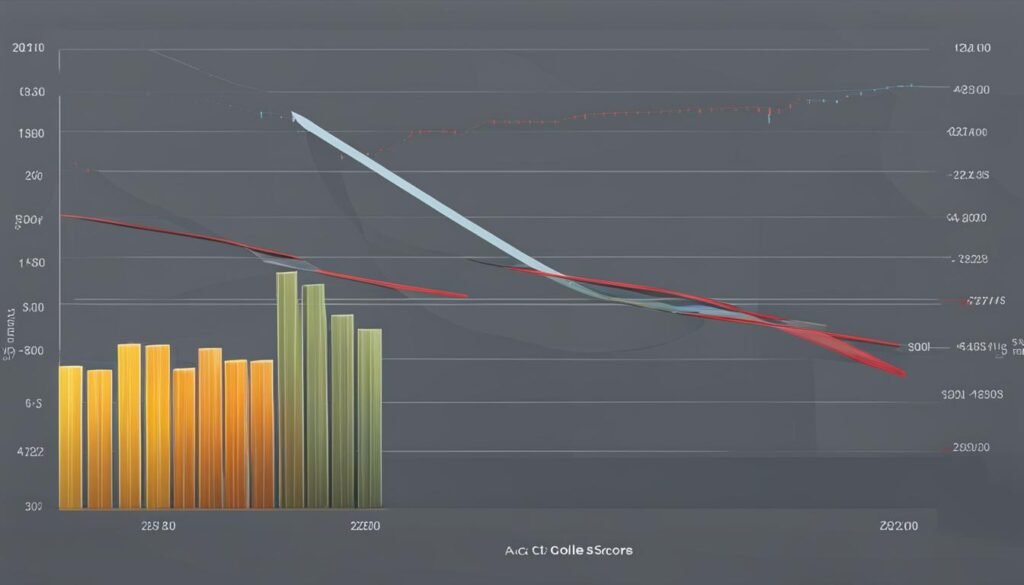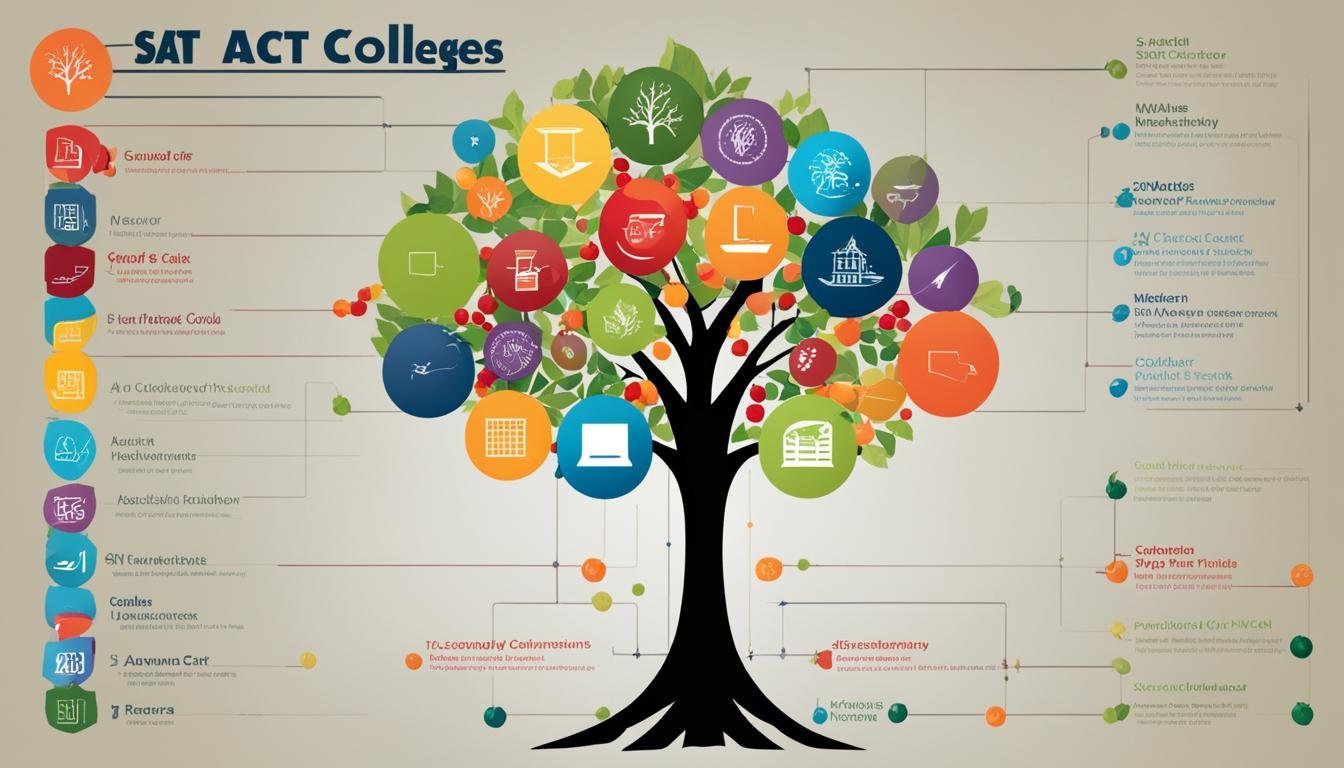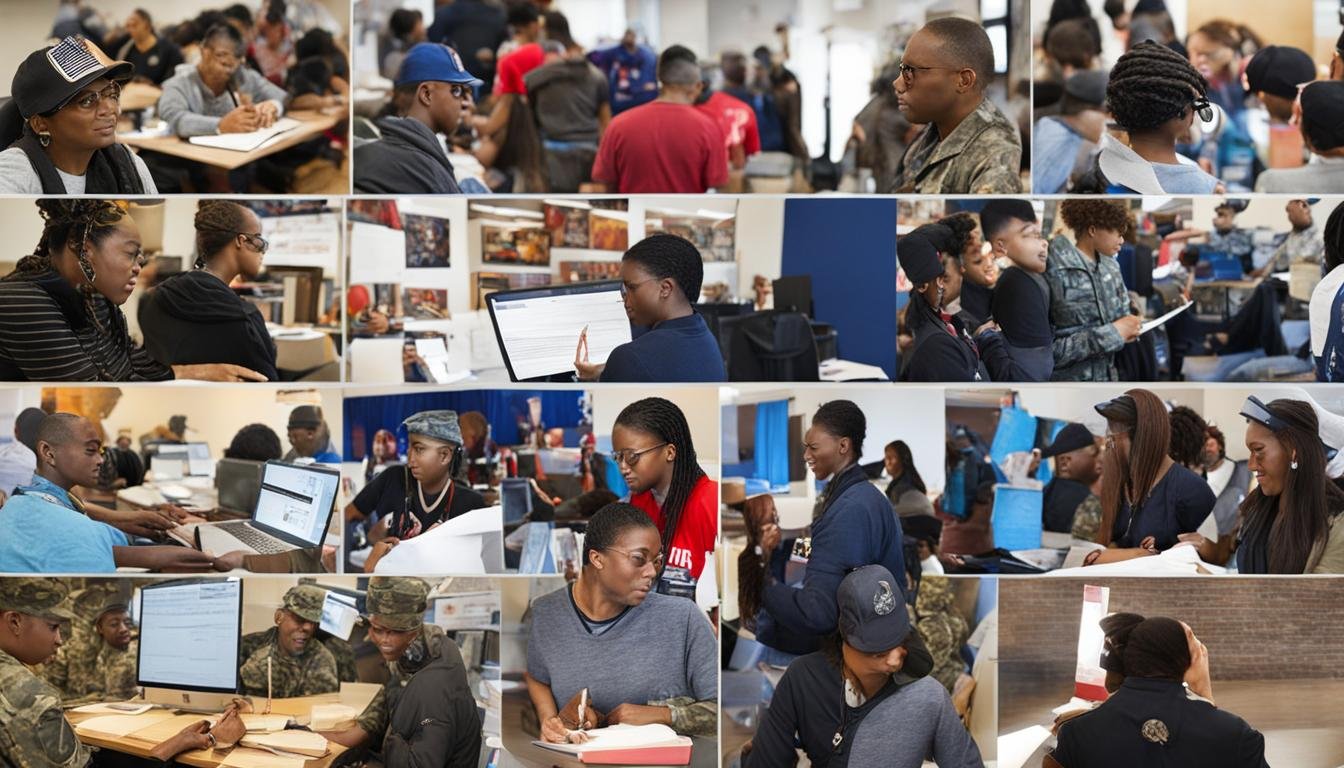When it comes to applying to college as a veteran, understanding the SAT/ACT score requirements is crucial. While these tests have become common for college admissions, the importance placed on them varies among institutions. In this section, we will explore how SAT/ACT scores factor into the admissions process for veteran-friendly colleges.
Key Takeaways:
- Veteran-friendly colleges may have different requirements for SAT/ACT scores.
- Some colleges waive the test score requirement for veterans.
- SAT/ACT scores may be used for placement in English and math courses.
- Highly competitive colleges may consider SAT/ACT scores in their admissions decisions.
- Research each college’s specific requirements to determine if SAT/ACT scores are necessary for admission.
College Admissions for Veterans with Military Experience
Many veteran-friendly colleges have adjusted their admissions requirements to accommodate veterans with military experience. These colleges recognize the unique skills and knowledge that veterans bring to the table and have streamlined their admissions process to make it more accessible for them. The SAT and ACT score requirements are often waived for veterans, taking into account their military transcripts and training credits instead. This allows veterans to showcase their experience and achievements in the military, which can be a valuable asset in the admissions process.
Admissions Policies for Veterans
Each veteran-friendly college will have its own admissions policies for veterans, so it is important for veterans to research and understand the specific requirements of the colleges they are interested in. Some colleges, like Seton Hill University, evaluate veterans with at least 25 awarded credits as transfer students, exempting them from the SAT or ACT requirement.
“We value the experience that veterans bring to our campus community and recognize their unique experiences and skills. Our admissions process takes into consideration their military training and credits, making it easier for them to transition into our college environment.” – Admissions Officer, Seton Hill University
Veterans should reach out to individual colleges to learn more about their admissions policies and requirements. It is also recommended to connect with the veterans’ resource centers or admissions offices at these colleges for personalized guidance and support throughout the admissions process.
Demonstrating Military Experience
Veterans have the opportunity to highlight their military experience and achievements in their college applications. Along with the application itself, veterans can submit their military transcripts, awards, and commendations to showcase their dedication, leadership, and discipline. These documents provide admissions officers with a comprehensive understanding of the veteran’s capabilities and potential contribution to the college community.
Admissions officers recognize the value of military experience and understand that it goes beyond standardized test scores. Veterans should take advantage of this opportunity to demonstrate their unique background and how it aligns with their desired field of study. Personal essays and recommendation letters can also shed light on the qualities and skills developed through military service.
Veteran-friendly colleges are committed to providing opportunities for veterans to pursue higher education and succeed in their chosen fields. By understanding admissions policies, leveraging military experience, and showcasing their strengths, veterans can navigate the college admissions process with confidence.
The Importance of SAT/ACT Scores for College Admissions

While some colleges have become test-optional for admissions, SAT and ACT scores can still play a significant role in the college application process. These standardized tests serve as a measure of a student’s academic abilities and potential success in college. For military veterans looking to further their education, achieving strong SAT/ACT scores can greatly enhance their chances of gaining admission to their desired colleges.
Highly competitive colleges, such as Ivy League schools like Harvard, still expect applicants to submit their SAT or ACT scores. These institutions use test scores as a way to assess applicants’ academic readiness and potential. Achieving high scores can demonstrate a veteran’s ability to excel academically, even if there may have been challenges in their previous educational experiences. A strong SAT/ACT score can help strengthen an applicant’s overall profile and increase their chances of being accepted into these prestigious institutions.
Furthermore, colleges like the University of California, Berkeley, consider SAT/ACT scores as part of a comprehensive assessment of an applicant’s qualifications. These scores provide an additional data point for admissions officers to evaluate a veteran’s academic preparedness. While other factors such as GPA, essays, and letters of recommendation play a significant role, SAT/ACT scores can provide an objective measure of a veteran’s academic abilities and potential.
Benefits of Strong SAT/ACT Scores for Veterans
- Enhanced competitiveness: Achieving high SAT/ACT scores can make veterans more competitive applicants, especially when applying to highly selective colleges. These scores can help offset any weaknesses in other areas of their application.
- Opportunity for merit-based scholarships: Many colleges offer merit-based scholarships to students with exceptional SAT/ACT scores. Veterans with strong scores may have access to additional financial aid opportunities.
- Placement in advanced courses: Some colleges use SAT/ACT scores to determine placement in advanced courses. A veteran with strong scores may have the opportunity to start their college journey at a more advanced level, saving both time and money.
“A strong SAT/ACT score can open doors to opportunities and help veterans stand out in the competitive college admissions process.” – College Admissions Expert
While SAT and ACT scores are not the sole determining factor in the college admissions process, they can significantly impact a veteran’s chances of acceptance. As veterans pursue higher education, it is crucial for them to dedicate time and effort to prepare for these standardized tests. By achieving strong scores, veterans can showcase their academic potential and increase their chances of gaining admission to their desired colleges.
| College | SAT Score Requirement | ACT Score Requirement |
|---|---|---|
| Harvard University | 1500+ | 33+ |
| University of California, Berkeley | 1340+ | 30+ |
| Stanford University | 1480+ | 32+ |
Do Veteran-Friendly Colleges Have Different SAT/ACT Score Requirements for Military Students?
Yes, veteran-friendly colleges may have different SAT/ACT score requirements for military students. However, the importance of test scores may vary depending on the school’s specific policies and the services and support offered to veterans. It’s advisable for military students to research individual college requirements before applying.
What are the SAT/ACT score requirements at veteran-friendly colleges for applicants with military duties?
Many veteran-friendly colleges take into account military duties and SAT/ACT prep when considering applicants. Some schools offer flexible score requirements for applicants with military duties, understanding the challenges they may face. It’s important for veterans to research specific schools’ policies to find the best fit for their academic goals.
Conclusion
The entry requirements for veteran-friendly colleges, particularly in regards to SAT and ACT scores, can vary significantly. While some colleges have waived the requirement for veterans or only use test scores for placement purposes, others still consider SAT or ACT scores as part of their admissions process.
It is essential for veterans to thoroughly research the specific admissions requirements of each college they are interested in. This will help determine if SAT or ACT scores are necessary for admission. By understanding the expectations of each institution, veterans can better prepare their application materials.
Additionally, veterans should showcase their military experience and achievements when applying to these colleges. Many institutions value the unique skills and perspectives that veterans bring to the campus community. Highlighting these strengths can be a valuable asset in the admissions process.
Ultimately, the requirements for veteran-friendly colleges are not one-size-fits-all. It is crucial for veterans to take the time to understand the nuances of each institution’s admissions process to ensure a successful application.



